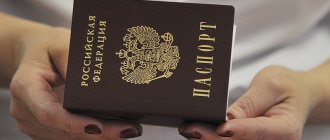The Constitution of Russia enshrines the rights of a citizen to freedom of movement and choice of place of residence, however, living outside the place of registration introduces additional difficulties into a person’s life. And if we talk about the current situation, then there are significantly more of them. In this publication, I will tell you what problems can await those who do not live at the place of registration, and I will also tell you how to protect yourself from these problems.
Registration and registration - a fundamental difference
The word “propiska” itself is used only in everyday life; it has been firmly established in the colloquial language since the times of the Soviet Union, when registration was a mandatory condition for a citizen to live in a certain territory. But from a legal point of view, at the moment such a concept no longer exists.
Conclusion of the Committee of Constitutional Supervision of the USSR dated October 26, 1990 No. 11 (2-1) “On legislation on issues of registration of citizens” and then Conclusion of the Committee of Constitutional Supervision of the USSR dated October 11, 1991 No. 26 (2-1) “On the licensing procedure registration of citizens”, it was recognized that the provisions on registration, obliging citizens to obtain permission from internal affairs bodies or other government bodies to reside in all settlements on the territory of the USSR, limit the right of citizens to freedom of movement and freedom to choose their place of residence.
Registration in Russia was formally abolished on October 1, 1993
since the entry into force of the Law of the Russian Federation of June 25, 1993 No. 5242-1 “On the right of citizens of the Russian Federation to freedom of movement, choice of place of stay and residence within the Russian Federation.” Nowadays registration does not officially exist in Russia; it has been replaced by the concept of registration.
At the same time, as the legislator justifies, these institutions have a fundamental difference: registration was a kind of permission to reside in a certain territory, while registration is of a notification nature
.
At the same time, in essence, registration is the responsibility of a citizen, and not his right, since the law states that citizens of the Russian Federation are required to register at their place of stay and place of residence within the Russian Federation within the time limits established by law.
Fulfillment of this obligation is ensured, not least by administrative measures.
, living at the place of residence and at the place of stay without registration may entail the imposition of an administrative fine on citizens in the amount of two thousand to three thousand rubles; for tenants, owners of residential premises (individuals) - from two thousand to five thousand rubles; for legal entities - from two hundred and fifty thousand to seven hundred and fifty thousand rubles.
Types of registration
In accordance with Art. 2 of the Law of the Russian Federation of June 25, 1993 No. 5242-1 “On the right of citizens of the Russian Federation to freedom of movement, choice of place of stay and residence within the Russian Federation”, registration is of two types: permanent
(at the place of residence) and
temporary
(at the place of stay).
Main difference
of these types of registrations is that permanent registration is valid indefinitely until the person himself wishes to be deregistered due to relocation or other reasons. The permanent registration stamp is placed in the passport. A citizen can also be discharged by court decision, for example, if a person is declared missing.
Temporary registration is being processed
if a person is not at his place of residence for more than 90 days. Registration at the place of residence is issued for a certain period - from 90 days to five years.
Punishment for lack of registration in the passport
According to the Code of Administrative Offenses, residence without registration is regulated by two articles:
- Art. 19.15.1 – specifically for residence without the appropriate stamp.
- Art. 19.15.2 – for violation of registration rules.
There is no clear distinction between these articles anywhere, and even the punishment for prosecution under them is almost the same, with a few exceptions.
The registration rules indicate how many days you have for registration . For example, a citizen of the Russian Federation has 7 or 90 days to register after arriving at a new/temporary residence address, but he has not registered. Then unpleasant consequences arise.
At the time of discovery of the expired deadlines, you can declare that you did not have time to fulfill the requirements, and this can be regarded as liability under Art. 19.15.2, and simply say that he did not intend to comply with the rules for any reason. Then Art. 19.15.1.
The prescribed punishment for both articles is a fine. It is imposed both on a citizen who is not registered on time, and on the owner of housing at his place of residence.
The amount of the fine depends on who the person prosecuted is, as well as on the locality.
- Citizens living without registration at their place of temporary residence must pay from 2 to 3 thousand rubles. For Moscow and St. Petersburg - from 3 to 5 thousand.
- An employer or owner who allows an unregistered person to stay in his home is punishable by a fine of 2 to 5 thousand rubles. For the capital and St. Petersburg, this figure will be from 5 to 7 thousand.
- A legal entity is punishable by financial liability from 250 thousand to 750 thousand rubles, from 300 to 800 thousand for Moscow and St. Petersburg.
- Punishment of officials applies only to Art. 19.15.2 Code of Administrative Offences. They are subject to a fine of 25 to 50 thousand rubles. For the capital and St. Petersburg - from 30 to 50.
Why is registration required?
The Constitutional Court of the Russian Federation has repeatedly indicated in its decisions that the mere fact of registration or lack thereof does not give rise to any rights or obligations for a citizen
and cannot serve as a basis for restricting the rights and freedoms of a citizen. Registration, in the sense in which it does not contradict the Constitution of the Russian Federation, is only a way of recording citizens within the Russian Federation, which is of a notification nature and reflects the fact that a citizen is at his place of residence or place of stay.
However, under the current registration rules, the lack of registration significantly complicates the life of citizens, since, first of all, the presence of registration is beneficial to the citizen himself. To apply for a pension, social benefits, register a car or other transactions
Registration at the place of residence (stay) in a specific locality is required.
There have also been numerous incidents related to the difficulties of children enrolling in schools and kindergartens, being assigned to a clinic, and so on. Citizens cannot confirm the status of a young family and the need for a housing subsidy if they are not registered in the same region.
In addition, without a registration stamp
, most likely, it will not be possible to conclude an agreement, since few people will dare to enter into an agreement with a person without a fixed place of residence. There are even cases of refusal to register a marriage due to the lack of registration of one of the future spouses, both permanent and temporary.
Fact of residence without registration
How is the fact of residence without registration usually established? The migration service must monitor compliance with registration laws in Russia. Usually, department specialists do not take measures themselves to search for people who have not completed their registration within the established time frame.
And the fact of long-term residence without appropriate registration is clarified at the moment when a person submits an application for registration. After all, sooner or later a person will have to apply for a stamp in his passport for registration.
Otherwise, he will be denied access to educational, medical, and insurance services. He will not be able to find a job or apply for the required subsidies or benefits. How are the specified deadlines determined? Let's say a person sold an apartment.
7 days begin to count not from the moment the purchase and sale agreement is concluded, but after moving to a new apartment and taking ownership. For the period preceding the purchase, you can arrange temporary registration with relatives.
A certificate of ownership may serve as documentary evidence that the registration deadlines have not been violated; real estate purchase and sale agreement; train or plane tickets confirming the date of arrival in the region.
What to do if there is no registration?
In the absence of permanent registration, you can apply for a temporary
. This will require the consent of the owner of the property in which the citizen intends to “register”.
To register at your place of stay you will need:
- identification document;
- application for registration at the place of stay (the form is filled out at a personal appointment);
- a document that is the basis for temporary residence at the specified address (this may be a rental agreement, social lease, sublease of housing; an application from the person providing housing, or another document);
Submit documents for registration
At your place of residence you can:
- online, through the portal of government services of the Russian Federation;
- in the area where the housing is located;
- at the management company of your home, if it provides passport office services.
Temporary registration is issued
, in addition, in a hotel, sanatorium, holiday home, boarding house, campsite, medical organization, tourist center or other similar institution.
How long can you live without registration?
In accordance with clause 5 of the Law of the Russian Federation of June 25, 1993 No. 5242-1 “On the right of citizens of the Russian Federation to freedom of movement, choice of place of stay and residence within the Russian Federation,” registration of a citizen of the Russian Federation at the place of residence is carried out within a period not exceeding 90 days from the date of arrival of the citizen in the residential premises
.
A citizen of the Russian Federation who has changed his place of residence is obliged no later than seven days from the date of arrival at his new place of residence
contact the person responsible for receiving and transmitting documents to the registration authorities for registration and deregistration of citizens of the Russian Federation at the place of stay and at the place of residence within the Russian Federation.
That is, if a person is deregistered at his place of residence
, he is obliged to contact the accounting authorities within 7 days to deregister and subsequently register at a new location.
If a citizen does not change his permanent registration, but simply arrived in a region different from his place of permanent registration, then he is obliged to register at his place of residence within 90 days.
Is it possible to defer the fine?
Practice under these articles in the Russian Federation has two features:
- Nobody seriously tracks the whereabouts of citizens, so people often live quietly without the necessary stamp for years. Apartment landlords are also in no hurry to report tenants, much less register them.
- Fines are often issued illegally, without taking into account the nuances of the situation. The articles of the Code of Administrative Offenses governing such cases have important notes.
According to the same notes, exemption from the fine is possible. There is no deferment as such, unless the person has provided some documentation proving a valid reason for not meeting the deadline.
The circumstances preventing registration must be such that the person really did not have the opportunity to register his stay (residence) in the new place.
IMPORTANT! There are rules that in some cases allow you to partially bypass these requirements. Please note that the periods of 7 and 90 days, firstly, are the notification periods for the FMS, and not the registration periods.
Secondly, 7 days apply to those cases when a person arrived for permanent residence, and 90 days - for temporary residence. Issuing a fine 2 weeks after a person has checked in temporarily is illegal and can be challenged.
From this follows the possibility of citizens in some cases simply declaring that they are living in a new place temporarily. This action will extend the period from 7 days to 90.
Exemption from administrative penalties
FMS employees are ready to issue a fine at the first opportunity, without analyzing the situation. However, many cases in which punishment is not prescribed are described in the notes to the above articles of the Code of Administrative Offenses. For example, a person does not have to pay a fine if:
- lives with relatives registered or registered at this address;
- lives in the same subject/city of the Russian Federation where he is permanently registered;
- has registration in the same subject/city.
The FMS does not keep detailed records of everyone moving from place to place , especially tenants. But if possible, I am always ready to take an extra fine from a person, without understanding the situation. Therefore, you need to know your rights in advance, assessing your particular case from the point of view of the law.
In particular, in order for a fine to be issued legally, there must be evidence of residence at a certain address longer than the period established for registration.
We invite you to learn a lot of new and useful information on the topic of permanent or temporary registration. Read these articles:
- How to recognize registration in an apartment as illegal or check information about it for authenticity?
- Fine for expired registration.
How can it even happen that a person does not have registration?
If a person does not have a current mark in his passport indicating his place of residence
, his relationship with government mechanisms in some situations becomes significantly more complicated, and in others it stops altogether.
There are actually quite a lot of reasons why a person may be left without registration. A person may voluntarily de-register with the intention of registering elsewhere. However, for some reason (for example, family reasons), I was unable to register at the new place.
Various fraudulent schemes are also rumored
, as a result of which a citizen may lose not only registration, but also his apartment.
Apartments of lonely and elderly people are traditional targets for attackers. The scammers’ scheme of action is usually as follows: elderly and lonely people are taken into confidence and, at the right moment, are asked to sign legal papers that are passed off as an “employment contract” or “an application for humanitarian assistance.” After which the victim ends up on the street or in a nursing home.
Or, for example, another case. A citizen bought an apartment and registered at his place of residence
. However, after some time it turned out that the seller of the apartment was a mentally ill person. Such a deal can be challenged in court, for example, by his heirs. And as a result, a citizen may find himself on the street without an apartment or registration.











